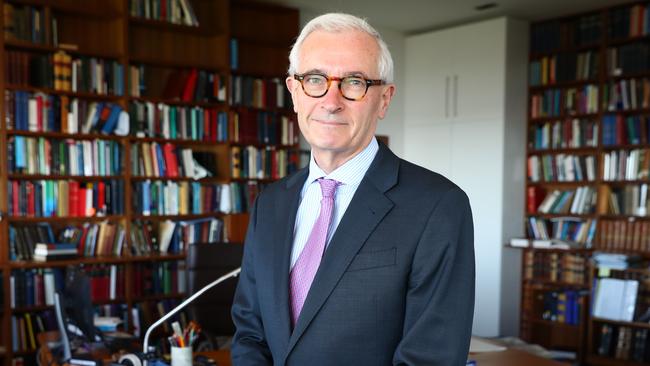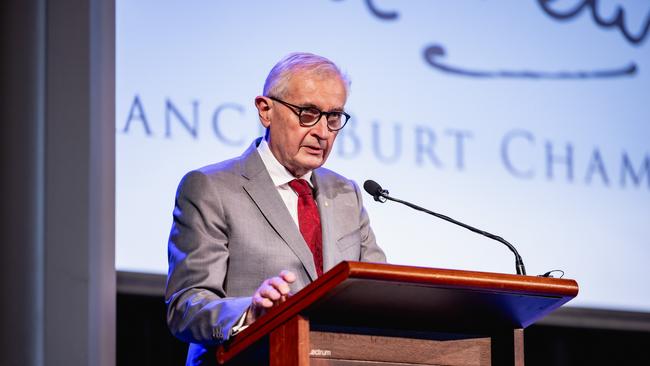Ex-Federal Court chief justice rejects robots in court, says compassion is key
Ex-Federal Court chief James Allsop has dismissed the idea of artificial intelligence acting in courtrooms, saying Australian law embraces the fairness and compassion of a human judge.

Former Federal Court chief justice James Allsop has dismissed the idea of artificial intelligence replacing humans in courtrooms, saying Australian law embraces the fairness and compassion of people, and would reject the rigid, mechanical conduct of a robot.
Mr Allsop, conducting the Sir Francis Burt Oration in Perth on Tuesday, said that while the tasks of junior and senior lawyers will change as machine learning develops to draft documents, produce research briefs and analyse contracts, the law cannot properly be applied without “human feeling”.
“The experiential, the implicit and the importance of feeling to the human circumstance allows the court, as an institution, with its experience and knowledge to express its response as the manifestation of just state power to the inherently human, infinitely varied, often tragic and violent situations before it,” he said.
Mr Allsop’s comments come as AI continues to infiltrate legal spaces, and Australian firms buy their own legal chatbots to carry the load for overworked practitioners.
Global firms Ashurst and Gilbert + Tobin have run large, cash-incentivised competitions for staff to come up with ideas to integrate AI. PwC and KPMG earlier this year bought expensive chatbots that lawyers can use to ask questions about dense legal matters.
Lander & Rogers has leveraged AI and machine learning to assist with due diligence, reviewing contracts, and research, while Dentons will use the technology for contract generation, predictive analytics and virtual assistants.
Overseas jurisdictions have begun melding technology and the law in even greater spates; in China where AI is being used to write judgments, and in Singapore where Legal Aid has developed a chatbot to provide information on family and civil disputes.
While law firms have been quick to leverage the technology for cost-cutting and productivity boosting, the Australian judiciary has been slower to get on board. In a speech delivered at the at the Commonwealth Law Conference earlier this year, Federal Court justice Melissa Perry lambasted a Colombian judge who used ChatGPT to decide whether a minor diagnosed with autism was exempt from paying for medical treatment.
Mr Allsop reinforced the “indefinable humanity of the law” and the necessity of compassion and fairness from judges, that cannot be replicated by technology alone.
“Logic, definition and precise taxonomy may solve many problems, but human judgement in relation to others is central,” he said. “I accept that human judgement can be mimicked (at least in result but also in a body of reasons) by a machine, but that is not the process of undertaking the process and making the human judgement, in particular when the judgement involves choice between two equally available conclusions.”

Mr Allsop said the greatest danger is “not from the machine, but from the human who thinks like the machine about the law.”
“That danger is real: some lawyers and some judges can be heard to say at times that text and logic form the law. For them the machine may begin to be human, but it is they who mimic the machine by refusing to accept or appreciate that the law is not abstract logic and words alone (important though they are); it is the indefinable presence of rule, principle and value; ultimately it is organised societal morality,” he said.
“The results of the application of the law may be mimicked by a machine; but for there to be a system of justice there must be the human process of engagement in the manner I have discussed.”
He spoke of one example where a judicial colleague had presided over a “most distressing” murder trial at Taylor’s Square in Darlinghurst in Sydney’s inner city, where the offender had stabbed his transgender partner to death in a violent domestic rage.
“The trial was run by the judge with a gentle, but firm, command, in a clear voice, but with evident compassion and fairness. After some days of hearing and deliberation, and late in the afternoon, the jury convicted the accused, who was then remanded in custody,” he said.
“Not long after, in the fading light after 5pm, the judge was grappling with the padlock on the gate. She noticed, a matter of yards away, the family of the now offender. They were obviously distraught and agitated.
“One, a sizeable young man, probably a brother of the convicted accused, stood and looked at the judge. The young man who had noticed the judge nudged and spoke
to the others. They turned, fell silent, and looked at the judge.
“Nothing was said, but the young man and one or more of the family nodded to the Judge in apparent recognition of who she was and in apparent acceptance of the fate that had come to them and to their son and brother.
“This was a silent and deeply emotional acceptance of the fairness and humanity of the process, and of the person who had presided over it.”








To join the conversation, please log in. Don't have an account? Register
Join the conversation, you are commenting as Logout